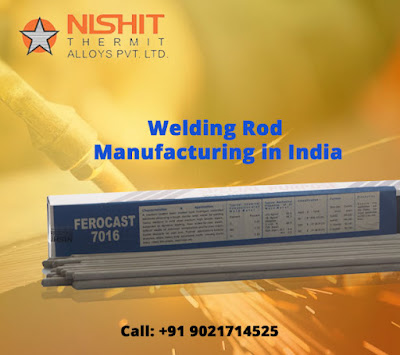For
over a hundred years arc welders were used for fusing pieces of metal together
to produce various products. With many innovations this system has been shown
to be practical. However, as modern production methods demanded a faster more
economical welding method that didn't require extremely qualified welders
became necessary. The basic arc welding system uses electricity to produce an
arc between a coated welding rod and the metal to be welded. Although a simple
enough process in detail it's actually required a rather competent welder to
produce satisfactory welds at an economical rate. The process also has other
faults.
The
Welding Rod Manufacturing in India is short in length, 12 to
16 inches, to ensure it is possible to properly handle them. Because they are
consumed as the welding progresses the welder needs to stop every couple of
minutes to load a new pole. In addition, he needs to adjust the distance from
the alloy as the sticks are consumed and become shorter while at the same time
maintaining the appropriate arc distance. This requires practice. In addition
the coating on these sticks which is used to shield the weld puddle from the
atmosphere leaves a coating onto the finished weld called slag. In most cases
this slag must be chipped away and wire brushed before the welding can
continue. This can be a job.
To
fix these problems a arc welding machine called a MIG, (metal inert gas), has
appeared. While the welding is performed by producing an arc between the
welding torch and the alloy as in standard arc welding, the actual process is
vastly different. First and important a MIG welder uses pressurized gas to
shield the weld puddle. This system leaves a clean weld without slag which
means that the welder has to spend time cleaning each weld before he starts the
next one.
Instead
of a brief consumable Welding Rod
Manufacturing in India the MIG system uses a coil
of welding cable which can be fed via the welding torch at a controllable rate.
While doing this the welder can maintain the arc by holding the welding torch
in the exact same place at all times. The welding torch has a trigger which
when pulled feeds the wire and starts the electrical current needed to produce
the welding heat. The shielding gas is also turned on as the cable is fed and
shields the weld puddle without leaving an residue which would need to be
cleaned. This system allows the welder to operate for long periods of time on
welds without stopping to replace his welding rod.
About
once per shift or the welder will replace the empty wire coil with a new roll
of cable and perhaps will need to replace the gas jar. Other than these chores
he is free to spend his time completing welds at a really economical rate. Any
competent person with eye site and standard mechanical can be taught to be a
production welder in a short time.
The
MIG welding machine has allowed manufacturers to greatly reduce their welding
costs. This system also works very well for Welding Rod Manufacturing in India which is extremely difficult to do with the standard
arcwelding system.
